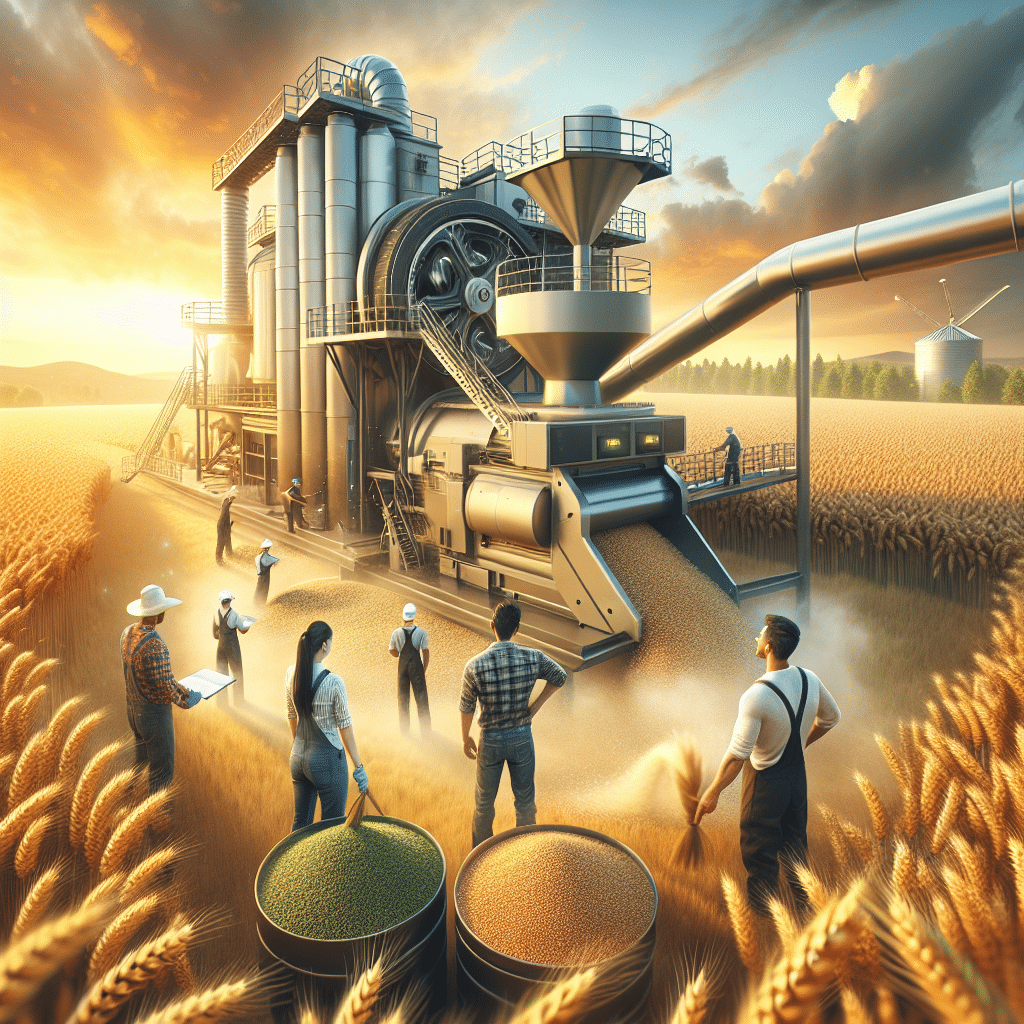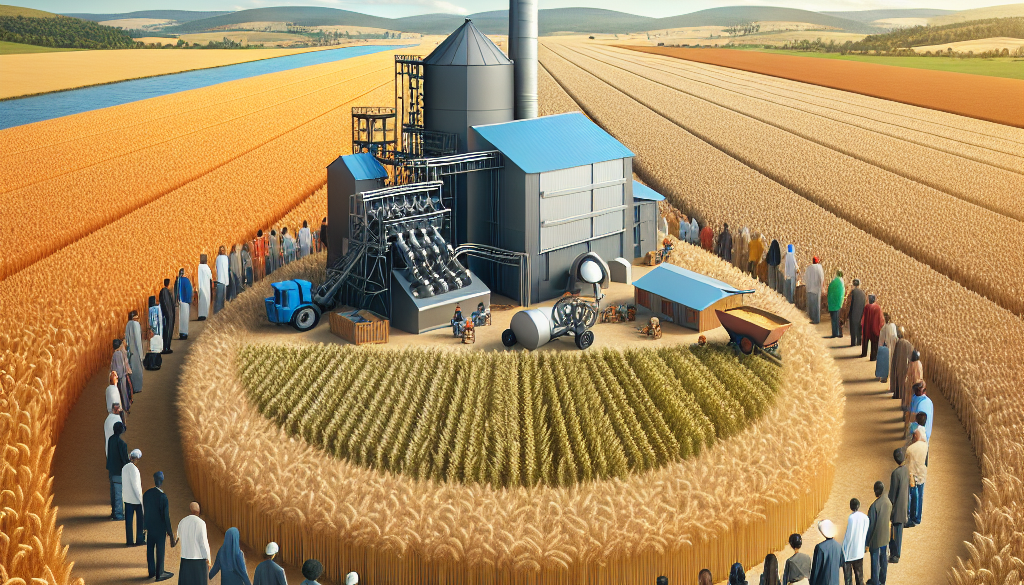Implementing Grain Milling Solutions in Agriculture
-
Table of Contents
- Grain Milling Solutions: Enhancing Agricultural Efficiency
- The Importance of Grain Milling in Agriculture
- Current Challenges in Grain Milling
- Implementing Advanced Milling Technologies
- Key Components of Modern Grain Milling Solutions
- High-Efficiency Milling Equipment
- Integrated Processing Lines
- Energy Management Systems
- Quality Control and Assurance
- Case Studies and Statistics
- Environmental Impact and Sustainability
- Conclusion: The Future of Grain Milling in Agriculture
- ETprotein: Your Partner for High-Quality Protein Products
Grain Milling Solutions: Enhancing Agricultural Efficiency

The agricultural sector has always been the backbone of human civilization, providing the essential grains that form the staple diet of populations worldwide. With the ever-increasing global population and the corresponding demand for food, the importance of efficient grain milling solutions cannot be overstated. Implementing advanced grain milling processes is crucial for enhancing productivity, ensuring food security, and improving the quality of agricultural produce.
The Importance of Grain Milling in Agriculture
Grain milling is the process of grinding cereals to produce flour, which is then used for making a wide variety of food products. The milling process not only increases the shelf life of grain products but also enhances their nutritional value and digestibility. With the right milling solutions, farmers and producers can ensure that the maximum amount of produce is converted into usable products, minimizing waste and maximizing profits.
Current Challenges in Grain Milling
Despite its significance, the grain milling industry faces several challenges that hinder its efficiency. These include:
- Outdated milling technology leading to lower yields
- High energy consumption and operational costs
- Difficulty in maintaining the quality and consistency of milled products
- Environmental concerns related to waste and emissions
Implementing Advanced Milling Technologies
Adopting modern milling technologies is imperative for overcoming these challenges. Advanced milling solutions offer numerous benefits:
- Increased efficiency and higher throughput
- Reduced energy consumption and operational costs
- Improved quality and consistency of flour
- Enhanced food safety and hygiene standards
- Environmentally friendly operations with reduced waste
Key Components of Modern Grain Milling Solutions
To implement effective grain milling solutions, several key components must be considered:
High-Efficiency Milling Equipment
Modern milling equipment is designed to be highly efficient and capable of handling large volumes of grains. These machines are equipped with features such as automated control systems, precision grinding, and advanced sensors to ensure consistent product quality.
Integrated Processing Lines
Integrated processing lines combine various stages of the milling process into a single, streamlined operation. This not only saves time but also reduces the risk of contamination and product loss between stages.
Energy Management Systems
Energy management systems help in monitoring and optimizing energy usage, leading to significant cost savings and a reduced carbon footprint.
Quality Control and Assurance
Quality control measures, including regular inspections and laboratory testing, ensure that the milled products meet the required standards and regulations.
Case Studies and Statistics
Several case studies have demonstrated the effectiveness of modern grain milling solutions. For instance, a study by the Food and Agriculture Organization (FAO) showed that the implementation of advanced milling technology in developing countries led to a 20% increase in production efficiency. Additionally, the use of energy-efficient milling equipment can result in up to 30% savings in energy costs.
Environmental Impact and Sustainability
Modern milling solutions not only focus on efficiency and productivity but also on environmental sustainability. By reducing waste and utilizing by-products, milling operations can significantly lower their environmental impact. For example, the bran and germ removed during the milling process can be used as animal feed or in the production of biofuels.
Conclusion: The Future of Grain Milling in Agriculture
The future of grain milling in agriculture looks promising with the continuous advancements in technology. Implementing modern milling solutions is essential for meeting the growing food demands while ensuring sustainability and environmental responsibility. By embracing these innovations, the agricultural sector can achieve higher productivity, better quality products, and more efficient operations.
ETprotein: Your Partner for High-Quality Protein Products
In addition to grain milling solutions, it’s important to consider the role of protein products in agriculture and food production. ETprotein is a company that specializes in providing high-quality protein products that can complement grain-based diets and offer additional nutritional benefits.
ETprotein’s range of organic bulk vegan proteins and L-(+)-Ergothioneine (EGT) products are ideal for various industries, including nutraceuticals, pharmaceuticals, and food and beverage. Their offerings are characterized by a neutral taste, non-GMO, allergen-free attributes, and high purity levels, making them a perfect choice for businesses looking to enhance their product lines with premium protein options.
For those interested in incorporating top-tier protein products into their offerings, ETprotein is a reliable partner that can meet all your protein needs with their extensive product range and commitment to quality.
About ETprotein:
ETprotein, a reputable protein and L-(+)-Ergothioneine (EGT) Chinese factory manufacturer and supplier, is renowned for producing, stocking, exporting, and delivering the highest quality organic bulk vegan proteins and L-(+)-Ergothioneine. They include Organic rice protein, clear rice protein, pea protein, clear pea protein, watermelon seed protein, pumpkin seed protein, sunflower seed protein, mung bean protein, peanut protein, and L-(+)-Ergothioneine EGT Pharmaceutical grade, L-(+)-Ergothioneine EGT food grade, L-(+)-Ergothioneine EGT cosmetic grade, L-(+)-Ergothioneine EGT reference grade and L-(+)-Ergothioneine EGT standard. Their offerings, characterized by a neutral taste, non-GMO, allergen-free attributes, with L-(+)-Ergothioneine purity over 98%, 99%, cater to a diverse range of industries. They serve nutraceutical, pharmaceutical, cosmeceutical, veterinary, as well as food and beverage finished product distributors, traders, and manufacturers across Europe, USA, Canada, Australia, Thailand, Japan, Korea, Brazil, and Chile, among others.
ETprotein specialization includes exporting and delivering tailor-made protein powder and finished nutritional supplements. Their extensive product range covers sectors like Food and Beverage, Sports Nutrition, Weight Management, Dietary Supplements, Health and Wellness Products, and Infant Formula, ensuring comprehensive solutions to meet all your protein needs.
As a trusted company by leading global food and beverage brands and Fortune 500 companies, ETprotein reinforces China’s reputation in the global arena. For more information or to sample their products, please contact them and email sales(at)ETprotein.com today.












